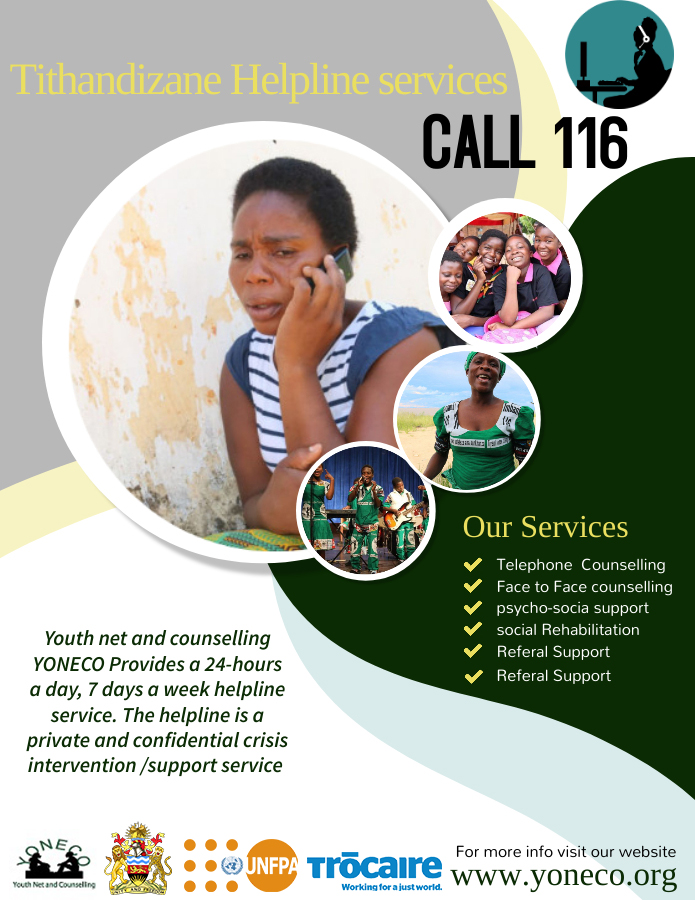1. PROJECT BACKGROUND
Youth Net and Counselling (YONECO) in collaboration with Education Expertise Development and Foundation (EEDF) and with financial support from Department for International Development (DFID) and technical support from EDUKANS and Aidsfonds is implementing a project called Empowering Young People in Managing Sexual and Reproductive Health Risks Project in Mangochi and Chikwawa districts. The project aims at reducing new HIV and STI infections and teenage pregnancies by increasing the uptake of health services among young people and also by improving the Comprehensive Sexuality Education programs for in schools and out of school youth as a way of enabling young people to make informed SRH choices. The beneficiaries of the project are young people aged 10-24 years. The project started on 1st September 2016 and will end on 31st March 2018. The project sought to achieve the following foreseen changes:
• Increase in uptake of YFHS, specifically STI/HIV testing and contraceptive use;
• Improve girl’s empowerment to take own decisions regarding SRH.
2. RATIONALE
The independent evaluation of EYP is a mandatory step by DFID to assess overall project performance during implementation period, its results identify key lessons learned for ending program and for the future strategies. The evaluation constitutes an important contribution to the envision programme on girls, youth sexual and reproductive health and potential for scaling up and disseminating knowledge being implemented by YONECO and EEDF in their organizational strategies. The independent evaluation will build on other studies that the project has carried out during its implementation period.
3. USERS OF EVALUATION
The evaluation will serve programming and management purposes for similar teenage, adolescent girls and young people interventions. The independent evaluation will generate important findings, lessons and recommendations that will be of use to a variety of stakeholders. The main users of the evaluation include government counter parts at national and district level (Chikhwawa and Mangochi), YONECO, EEDF, Edukans, Aidsfonds, DFID and civil society organizations at community level who support the empowering of teenage and adolescent girls.
4. OBJECTIVES
The specific evaluation objectives are to:
• To independently verify (and supplement where necessary) record of achievement as reported through Annual Reports and defined in the project’s log frame.
• To assess the extent to which the project performed well and was good value for money, which includes considering;
i. How well the project met its objectives;
ii. How well the project applied value for money principles of effectiveness, economy, efficiency in relation to delivery of its outcome;
iii. What has happened because of DFID funding that wouldn’t have otherwise happened; and
iv. How well the project aligns with DFID’s goals of supporting the delivery of the SGDs.
• Assess how EYP has contributed to the achievement of national priorities as reflected in key national goals, policies and other instruments.
• Assess the likelihood of EYP and its activities to continue at national, district and community levels beyond the support received in the period of intervention.
• Draw lessons learnt – What lessons have been learnt so far which can be applied in the similar interventions on young people focusing on adolescent and teenage girls.
• Appraise the project partnership approach (including management structures, communications and relationships) to community implementation, research and advocacy in relation to the project’s achievements.
5. DELIVERABLES
• An inception report demonstrating understanding of the assignment within one week from the start of the assignment.
• An evaluation design methodology that satisfactorily demonstrate how the EYP will be evaluated
• A time table for the evaluation exercise
• Tools for the evaluation exercise
• Draft report that will be used for a validation workshop with key stakeholders.
• A well written project evaluation report of not more than 30 pages on EYP addressing the objectives of the assignment within 30 days of the assignment. (Outline of the report to be shared to successful consultant)
6. TECHNICAL SUPPORT
• The successful consultant will work under the supervision of the Program Manager and the Monitoring and Evaluation Manager with technical support from Aids Fonds and Edukans.
• YONECO and EEDF will support the process through provision of relevant information and linkages to project beneficiaries and stakeholders at district and community level.
7. SPECIFIC REQUIREMENTS
• Academic Qualifications
a) A higher degree in public health, development studies or any related relevant field
• Professional Qualifications
a) An evaluation specialist with a minimum of seven years’ experience in SRHR and youth programme/project evaluation in an international development context.
b) Experience of results-based monitoring and evaluation;
c) Ability to design and plan the evaluation approaches and research methodologies, including quantitative and qualitative research methods. Where feasible and proportionate, the person or team should include skills and expertise required to design, plan and conduct impact evaluation, potentially using experimental or quasi-experimental techniques;
d) Relevant subject matter knowledge and experience such as education sector, genders, Youth programming, non-state actors and economic growth to ensure the evaluation design and research methods are as relevant and meaningful as possible given the aims and objectives of the project and the context in which it is being delivered;
e) Ability to manage a potentially large-scale and complex evaluation and research process, including interpreting baseline data and conducting a final evaluation;
f) Design and manage data and information systems capable of handling large datasets for monitoring and evaluation purposes
g) Must have appropriate country knowledge/experience including understanding of the context of the project impact areas.
8. EXPRESSION OF INTEREST
YONECO requests Financial and Technical Proposals from qualified research agencies, project evaluators and individual consultants. The proposals should be sent to:-
The Executive Director
Youth Net and Counselling (YONECO)
C/o Youth Leadership Development Centre
P.O. Box 471
Zomba
Email: recruitments@yoneco.org.mw or recruitment@yoneco.org,mw
Closing date: 16th April, 2018

